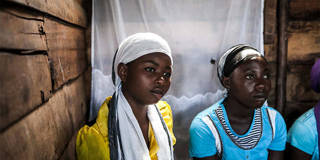One of the greatest challenges facing women in much of the developing world is the gap between their legal rights and their ability as individuals to claim them. But that could soon change, thanks to a case brought to the UN by two Tanzanian widows who were dispossessed of their homes by discriminatory inheritance laws.
SEATTLE – One of the greatest challenges facing women in much of the world is the gap between their legal rights and their ability as individuals to claim them. National constitutions are increasingly likely to guarantee gender equality, but many also recognize the authority of parallel legal systems based on custom, religion, or ethnic affiliation. And, unfortunately, law in many parts of the world has not kept up with changing times.
Fortunately, international human-rights bodies are taking notice of the gap. In 1999 and 2000, two young Tanzanian tailors, married in their teens and widowed in their twenties with four children between them, were dispossessed of their homes under their ethnic group’s customary laws of inheritance. Those customary laws give male relatives a greater claim to the deceased’s possessions than female members of his family, and typically bar wives altogether and give short shrift to daughters. In both of the Tanzanian cases, local courts ruled that the property the woman had shared with her husband, including items that had been purchased with proceeds from her labor, should go to her brother-in-law.
The young widowed tailors were left homeless with their children, but they refused to accept their dispossession. With the help of Tanzania’s Women’s Legal Aid Center and Georgetown University’s International Women’s Human Rights Clinic – which I previously directed – they challenged the decision in the High Court of Tanzania. In 2006, the High Court concluded that customary laws on inheritance were “discriminatory in more ways than one,” but it refused to overturn them. The court likened doing so to “opening a Pandora’s box, with all the seemingly discriminative customs from our 120 tribes” vulnerable to legal challenge.

SEATTLE – One of the greatest challenges facing women in much of the world is the gap between their legal rights and their ability as individuals to claim them. National constitutions are increasingly likely to guarantee gender equality, but many also recognize the authority of parallel legal systems based on custom, religion, or ethnic affiliation. And, unfortunately, law in many parts of the world has not kept up with changing times.
Fortunately, international human-rights bodies are taking notice of the gap. In 1999 and 2000, two young Tanzanian tailors, married in their teens and widowed in their twenties with four children between them, were dispossessed of their homes under their ethnic group’s customary laws of inheritance. Those customary laws give male relatives a greater claim to the deceased’s possessions than female members of his family, and typically bar wives altogether and give short shrift to daughters. In both of the Tanzanian cases, local courts ruled that the property the woman had shared with her husband, including items that had been purchased with proceeds from her labor, should go to her brother-in-law.
The young widowed tailors were left homeless with their children, but they refused to accept their dispossession. With the help of Tanzania’s Women’s Legal Aid Center and Georgetown University’s International Women’s Human Rights Clinic – which I previously directed – they challenged the decision in the High Court of Tanzania. In 2006, the High Court concluded that customary laws on inheritance were “discriminatory in more ways than one,” but it refused to overturn them. The court likened doing so to “opening a Pandora’s box, with all the seemingly discriminative customs from our 120 tribes” vulnerable to legal challenge.